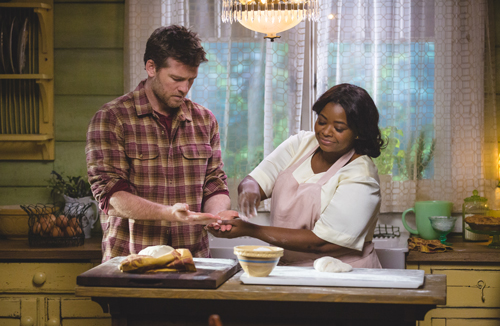Octavia, she and I just hugged a lot. She was thrilled. Since she read the book, she had wanted to play this role, so that was something that had been on her heart. All this that happened on set was incredible. Talking with Joseph Nemec and sharing his heart and love for the book and what this meant for him…yeah, lots of cool stuff.
CCM: Why do you think this metaphor really resonates with people? Being able to have a “place” to put the things that get us stuck, as you’ve mentioned, hurtful things. What is it about getting a place for those?
WPY: I think the book and the movie accomplishes a couple of things amid a whole bunch, because different people hear and see different things depending on where they’re at. One thing, is it gave people a language to have a conversation about God that wasn’t religious. It was relational. That is very powerful, because faith means a lot to a lot of people—but a lot of times, our religious traditions have not given us good language for anything other than performance. This is not about performance. This is about limitless affection.
The second thing is, that it honored our humanity. That is, the two things that human beings have in common—regardless of our political, ideological, religious, economic, ethnic, or cultural differences—we share love and loss. Those two things. The movie and the book focus on love and loss, and there is such an honoring to our “great sadnesses” that a lot of times our culture doesn’t let us. That is to say, your tears actually matter. Who you are as a human being and what you’ve experienced matters—and the questions that have arisen out of that, those matter too—and it honors that. You get to be inside Mackenzie’s world, and you can feel it. To me, the greatest loss that a human being can experience is the loss between a parent and a child, because that’s the deepest loss—one that God identifies with completely. But, because it’s the deepest loss, it picks up all the others along the way.

scenes from “The Shack”—Lionsgate, Mar. 3, 3017
I’ve thought about that, because I remember when I was working on the first manuscript for the kids, thinking, “Why would I write this for my kids?” Like [my wife] Kim once said, “Write something that puts in one place how you think, because you think outside the box.” I’m thinking, “All right, sadly, we live in a world where this kind of tragedy happens. This kind of tragedy asks the best questions about us as human beings and about the nature and the character of God.” I think that has resonated deeply with people.
Surprised, I didn’t know anyone outside my friends and family would care, but they have, and around the whole world. You can feel it. When you’re watching the film, you get caught. Just like when you’re reading the book, you get caught by surprise and by emotion that the beauty of creative art, or fiction, if it’s done even half-well it has a real powerful way of “sneaking past our watchful dragons,” as C.S. Lewis would call them, and finding a place. Music does that, too.
CLICK “6” TO ADVANCE”

 Listen Live
Listen Live
I have not read the book, nor will I, and I most certainly will not watch a movie based on this man’s imagination. Hank Hannegraff summed it up perfectly.
The book was so filled with blasphemy that I threw it away. I will never watch the movie.
We all like to live in a diorama picturing God and our personal spiritual beliefs as we have been taught and what we have chosen to learn through our life’s experiences! This book and movie will challenge an individual to open their minds eye and theoretically examine the possibility of God as portrayed thru the experience portrayed in Mackenzie’s life! I am closer to Our Heavenly Father because of it! Movie is very well cast and portrayed!